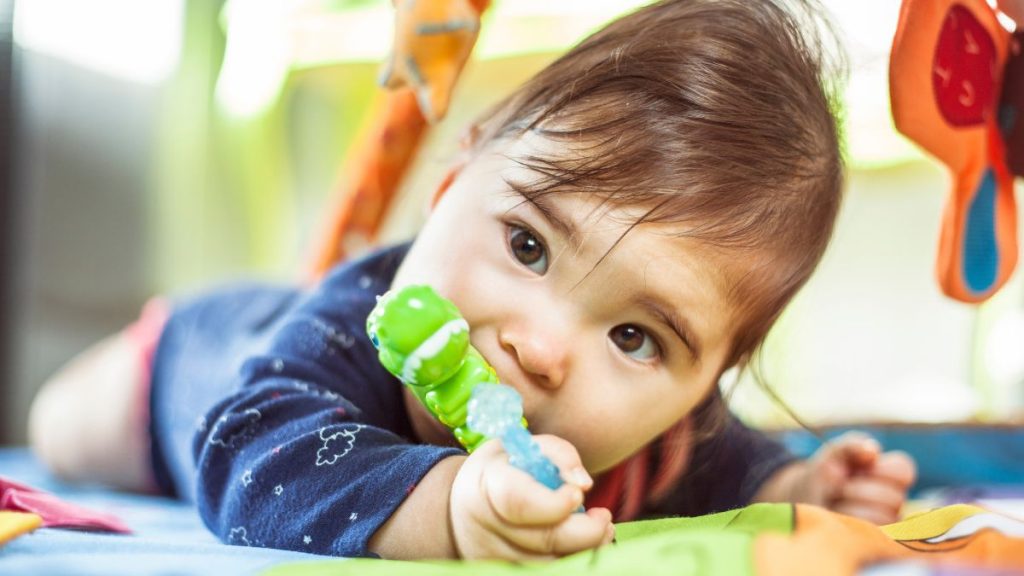Teething in Babies
When a baby starts to teeth, it can be a trying time for both the baby and the parents. Teething can cause a baby to become irritable, have trouble sleeping, and drool more than usual. There are a few things parents can do to help soothe their teething baby, however.
First, a teething baby will often want to chew on something. Providing them with a teething ring or a cold, wet washcloth to chew on can help. Second, you can rub your baby’s gums with your finger to help ease the discomfort. Finally, giving your baby something cold to eat or drink can also help. Popsicles or ice water are good options.
If your baby still has a lot of discomforts, you can talk to your pediatrician about other options such as teething gels. With a little patience and care, your baby will get through this phase and be that much closer to a beautiful smile.
What are the first signs of teething?
The first signs of teething can vary from baby to baby, but there are some common signs that you can look out for. These include:
- Sore or tender gums: This is usually the first sign that baby is starting to teeth. You may notice that your baby’s gums are red and swollen, and they may be extra sensitive to touch.
- Drooling: As the gums become more irritated, your baby may start to drool more than usual.
- Chewing: Baby may start to chew on anything they can get their hands on, including their fingers, to help relieve the discomfort in their gums.
- Irritability: Teething can be painful, so it’s not surprising that babies can get cranky and irritable when they’re going through it.
If you’re concerned about your baby’s teething, talk to your pediatrician. They can offer guidance and advice on how to help your little one through this uncomfortable time.
How long does teething in babies usually last?
Teething is a process that can begin as early as 3 months old and last until a child’s third birthday. Some babies may even be born with teeth! While teething, a baby’s gums will be sore and they may drool more than usual. They may also be more irritable and want to chew on things.
There are a few things you can do to help your baby during this time:
- Rub their gums with your finger or a wet washcloth.
- Give them a cool, wet cloth to chew on.
- Offer them a teething ring or toy to chew on.
- Give them a pacifier.
If your baby is having a lot of trouble, talk to your pediatrician. They may recommend giving your baby a pain reliever such as acetaminophen or ibuprofen.
Teething is a normal process that all babies go through. With a little patience and some TLC, your baby will be through it in no time!
How do babies act when they teething?
There is no one answer to this question as every baby is different. However, some common signs that a baby is teething include drooling more than usual, chewing on anything they can get their hands on, being irritable, and having a low-grade fever. If you think your baby is teething, it is best to consult with their pediatrician.
If your baby is teething, you can do a few things to help them feel more comfortable. Give them something to chew on, such as a cold teething ring or a wet washcloth. You can also rub their gums with your finger. If your baby is having trouble sleeping, try giving them a small dose of children’s ibuprofen.
Teething can be a difficult time for both babies and their parents. However, it is a normal part of development and eventually, all babies will get through it.
How can I relieve my teething baby?
There are a few things that you can do to help relieve your teething baby. One is to give them something to chew on that is safe for them to chew on. You can also rub their gums with your finger to help soothe them. You can also give them a cold teething ring to help numb their gums.
If your baby is older, you can also try giving them a popsicle or ice cream to help numb their gums. You can also give them pain medication if they are in a lot of pain, but be sure to check with your doctor before giving them anything.
Teething can be a painful experience for your baby, but there are things that you can do to help ease their pain.
To learn more about teething in babies and ask your questions, give us a call at 248-650-2440 or visit our dental clinic.
Please visit our Linkedin page for more information.


0 comments on “Teething in Babies”